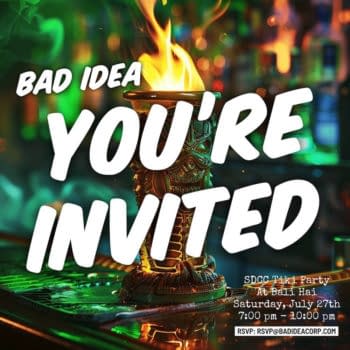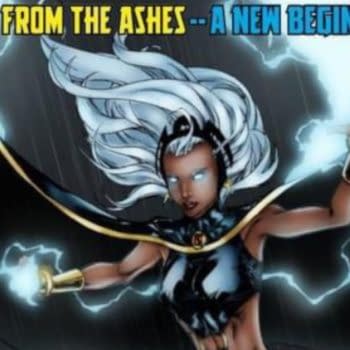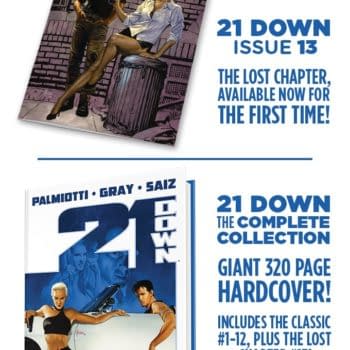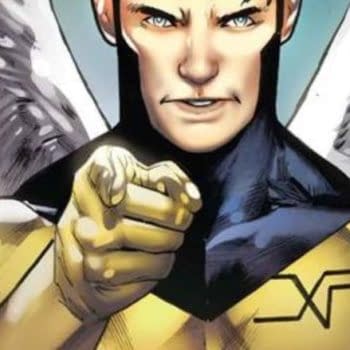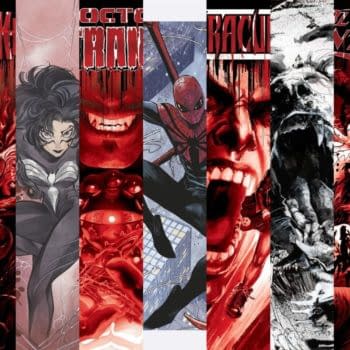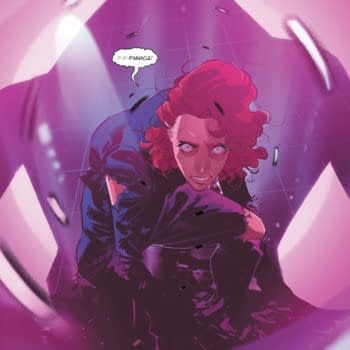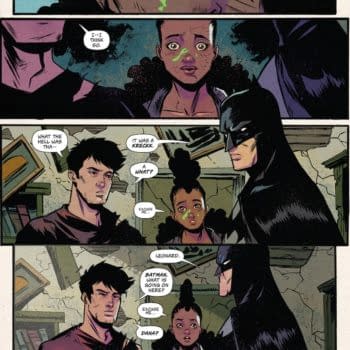Posted in: Comics, san diego comic con | Tagged:
19 San Diego Comic Panels In Audio – And The Eisner Awards!
Jamie Colville, the human recorder, delivers another stunning runaround San Diego Comic Con. As he puts it, 19 panels in audio and summary as well as the Eisner Awards and a stack of photos for both.
As ever, we are honoured to run his descriptions – and audio embeds – for all! It's just like being there…
 Graphic Novel Programming At Your Library (47:43, 43.6mb)
Graphic Novel Programming At Your Library (47:43, 43.6mb)
On the panel was creator Greg Evans, retailer Joe Field and Librarian Hillary W. Chang. Hillary had organized a Hawaii tour for Greg Evans around a number of Libraries. She talked about reaching out to creators to get them to do visits. Greg talked about how much lead time is required for creators and the difficulties of agreeing to a visit either too far out or too soon. Joe talked about the amount of time needed to successfully plan the event and needing at least 2-3 months of lead time. Joe also gave a origin of FCBD and how he and other libraries use it to do events. Hillary explained why Librarians should get involved and the best way to do it. Evans gave the differences between doing an event at a Library vs a book store. Hillary told a humorous story about internal difficulties in planning the event, but said the visit is well worth any problems that can come up. A lot of Librarians were in the audience and asked questions about their situation and doing programming. I came in a few minutes late to this panel.
 Spotlight On Bill Finger: The co-creator of Batman (47:10, 43.1mb)
Spotlight On Bill Finger: The co-creator of Batman (47:10, 43.1mb)
The panel was moderated by Dr. Travis Langley and on it was Benjamin and Athena Finger, Lee Meriwether, Michael Uslan, Marc Tyler Nobleman, Mark Evanier, Jens Robinson and Tom Andrae. Part way through the panel Writer/Editor Denny O'Neil came up on stage and talked about his meeting and spending an evening with Bill Finger. They showed a video montage of some of the things Bill co-created, from Batman characters, Wildcat and the original Green Lantern. Part way through the panel a Neal Adams video was played where he talked about the importance of Bill Finger. Michael Uslan talked about meeting Bill twice as a kid and taking Athena and Jerry Robinson to the Dark Knight movie premiere and introduced them to the director and actors who played the major characters. Tom said when he co-wrote the Batman and Me book with Bill Finger and getting as much about Bill Finger in there as he could. He also revealed that Orson Wells was a fan of Batman comics and used a bit of a Batman story Bill wrote for a movie. Athena said she was in hiding and how people didn't believe her when she spoke about her grandfather being the co-creator of Batman. She thanked Marc for finding her and slowly bringing her out. Benjamin also said the same thing, kids didn't believe him until Marc's book was in his school and he could show it to them. Lee Meriwether talked about meeting Batman fans and what makes them different. She was also really happy to be a part of the "Batman family." Jens Robinson discussed his father Jerry Robinson and his role in working on Batman. Mark Evanier gave the origin on the Bill Finger award, Jerry Robinson's role and his own experience of meeting Bill Finger.
 Spotlight on Colleen Coover and Paul Tobin (49:47, 45.5mb)
Spotlight on Colleen Coover and Paul Tobin (49:47, 45.5mb)
The two talked about their body of work with the covers on a screen. They started off with The Fringe and went through Small Favors, Banana Sunday, Marvel Adventures, X-Men First Class, Gingerbread Girl, Prepare to Die, Bandette, Colder, Batman 66, Adventure Time: The flip side mini-series, The Witcher and then announced books that were upcoming from them. This included Angry Birds, I was the Cat, an Aliens, Prometheus and Predator book that ties all 3 worlds together, Colder The Bad Seed, a new print collection of Bandette that reprints issues 6 to 9 and a new 5 book deal Paul sold to Bloomsbury for a middle age book series. Along the way the two of them talked about things in particular to a title or just in general. Both of them worked in comic shops and for a while Paul worked at Powell's bookstore, which had a perk of being able to borrow books for a long time or buy them at an employee discount. Paul discussed making Marvel Adventures an all ages book, meaning adults can enjoy it too, he didn't like that often All Ages is thought of as kids only comics. Paul said he liked writing stories from a variety of genres to keep him fresh as it helps him to be a better all-around writer than just sticking to one genre would. In particular he liked doing stories other than event type comics, taking something small and making it an event for that particular character. He laughed about once turning in an issue of Marvel Adventures that had an 18 page fight scene in response to an editor who was always asking for more action, only the have the editor still ask for more action. Both Colleen and Paul chatted about Bandette, the online comic from Monkey Brain and how they liked the freedom of being able to tell the story without a publisher mandated page count, if the story required less or more pages, they can do it. Paul has been doing a bunch of video game related comics, which he said was messing with his video game downtime as he sometimes can't take his mind off comics while playing them now. Colleen said she wanted her characters to have fun in her stories. The Aliens/Prometheus/Predator book all has writers living in Portland, which is says is great for getting together and hashing out stuff between them.
 Jules Feiffer Goes Noir (54:17, 49.7mb)
Jules Feiffer Goes Noir (54:17, 49.7mb)
Panel was with Mark Evanier, Paul Levitz and William Menaker, from Liveright, a subdivision of WW Norton. Jules Fifer was supposed to be at San Diego but had to decline due to recent health issues. Paul discussed doing an interview with Jules for his upcoming book about Will Eisner. Jules revealed he was working on a new book called Kill My Mother and it's a noir book, something he held off doing for a very long time because he felt his noir storytelling was not as good as Will Eisners. Jules now felt confident enough to give it a try. They had a couple of Kill My Mother books there and passed them around the audience. Mark and Paul talked about the importance of Jules the Great Comic Book Heroes book. They said he had brought a lot of respectability to comics because Jules was incredibly respected for his comics and other award winning written works. So if Jules said these Golden Age comic artists were good, then people who had dismissed them began re-examining them with a different perspective. Part of the book was printed in Playboy and this lead to Bill Everett getting work in comics again as he was called a genius in that excerpt. Mark said the book was like the opposite of Seduction of the Innocent. Paul mentioned that Jules grew up in the same neighbourhoods with the same income and education level as most comic artists of the golden age but managed to bring himself up to much higher heights in terms of diversity and respectability, but Jules always owned up and never shied away about his past in working in the comic book industry. William also talked about Jules and how WW Norton wanted to publish anything Jules would create. The group talked about how Jules was doing new and experimental work, which at his age (83) was very surprising. Mark talked about seeing a play that had dancers holding the pose of a Jules dancing drawing, while people in street clothes came in and read dialogue from his comics. It was a very entertaining play to watch both those things and he's surprised it's still not in production somewhere because it's a very cheap play to put on. They took Q&A from the audience and revealed which Golden Age artists influenced Jules.
 Teaching Content Through Comics: Math, Science and History (54:37, 50.0mb)
Teaching Content Through Comics: Math, Science and History (54:37, 50.0mb)
On the panel was Jason Batterson, Tracy Edmunds, Geoffrey Golden, Josh Elder, Nick Dragotta and Jonathan Hennessey. This panel started a few minutes early. Jason talked about his math book taught in comic book form where the characters are monsters and how girls have been "caught" secretly reading it on the playground. Geoffery Golden discussed his book Probamon, a pokemon parody that shows kids how to solve math/logic problems. It's very much inspired by Square 1 and Sesame Street. Nick Dragotta does Howtoons, a science comic about building things out of local household items. It encourages kids to learn by playing, following the instructions of the book. He mentioned he has 1 page showing kids how to use a hacksaw and as a result some Libraries put the book into the adult section. He disagrees with this as he thinks kids need to learn how to use tools in order to get into the nitty gritty of building things. He has a 2nd book coming out. Fred Van Lente announced his new books, Action Presidents (US). It is a follow up to his Action Philosophers series. Jonathan Hennessey showed his The Comic Book History of Beer and said it's his goal to bring ideas that have been floating around in academia out into a more mainstream audience via the graphic novel format. In particular this looks at the theory that early humans learned to do agriculture in order to create beer and not to feed themselves. At the end Josh Elder plugged his Mail Order Ninja book.
 Manga: Lost in Translation (49:20, 45.1mb)
Manga: Lost in Translation (49:20, 45.1mb)
The moderator was Jonathan Tarbox, on the panel was Ed Chavez, Lillan Diaz-Przybyl, Nathan Collins and Stephan Paul. Lillan talked about trying to find the origin on Glomp and things it could be a Matt Thorn created sound effect. They took questions and said that sound effects are a difficult thing to translate from Japan. They have 2 different types of sound effects and some of them make noise for things that don't make noise, like the reaching of a hand. They also said Japanese puns are also very difficult and have to come up with a US equivalent that gets the spirit of the joke across. The group discussed problems generated for them by bad scalations causing fans to get mad at them for "getting it wrong" when they have a better knowledge of the Japanese language than the scanlators. They also revealed sometimes their "wrong" translations are due to Japanese editors who can't read English (and likely got an intern who barely understands English to translate for them) demand changes to something incorrect because they feel they need to change something to justify their job. Most of them talked about doing translation on a freelance basis, which many of the panelists were. Editors on the panels said it's in their interest to have a number translators working for them part time. They fear if they rely on a few key people and one gets sick it can make the books late. They also said using the same translators creates a sameness across the line in terms of the voice of the comics. The more translators working reduce that. The group didn't like editors that paid extremely low rates or in 1 case nothing at all as they asked scanalators to do the work for free. They gave $10 a page as being a very, very good rate for a translator. They also said the negotiating part for a page rate is difficult, too high you don't get the work, too low and you have a difficult time getting better rates down the road. They also talked about translator should technically be invisible so that it's a seamless reading experience but they'd like to get credit, copyright and royalties for their work. The group also discussed using Japanese terms vs American ones and said sometimes you should keep things more on the Japanese side like when it's a historical story.
 Will Eisner Teacher And Mentor (47:41, 43.6mb)
Will Eisner Teacher And Mentor (47:41, 43.6mb)
On the panel was moderator Paul Levitz, Joe Quesada, Batton Lash, Drew Friedman, and Mike Carlin. The panel was about Esiner's time teaching at the New York School of Visual Arts. Batton talked about how he and a friend talked the principal into starting a comic book art course. The principal said if 30 students signed up they would do it. He asked what teachers they would like and as a perfect wish list they suggested Will Esiner and Harvey Kurtzman. They were flabbergasted when they both agreed to become teachers. Paul asked who would be a good teacher today and Mike Carlin suggested panellist Joe Quesada (who said he couldn't due to professional time constraints). Drew said when he was there, only a few students in the class know the importance of the teachers they had. Quesada talked about while he was there he had a 2 hour conversations with Eisner and how much he learned from him. He also talked about prior going to the school he was trying to draw like Mike Mignola and when he met him, Mike knew who he was, told him he was aping him wrong and spent 5 hours helping him out, which was huge for him. They discussed Gallery Magazine, which was a magazine Will put out with the students work. Drew was the editor of it for 1 year. Will was big on not just how to draw, but also how to manage yourself in the business end of being an artist. He was big on the artist being in charge of their own work. At one point Will would bring in other artists to teach a class like Neal Adams. Will very strongly insisted that comics would not die, despite the naysayers. He promoted the medium and believed it would always survive. Quesada said while the business goes up and down, if the business survived Wertham and the Senate Hearings then comics aren't going away. Drew said his father worked for Magazine Management Inc (the owner of Marvel comics – that published magazines). He said got Marvel comics from him back in the early 60s. Mike Carlin said he learned about storytelling from Eisner. Paul said Will knew that everything on the comic page was there for a reason and he would big and finding and explaining that reason. The group talked about Eisner's Sequential Art books and other good books out there now. They also discussed comics now being done digitally and how they think he would react to that. The group revealed how both Eisner and Kurtzman would pay students for jokes for their books.
 CBLDF: Graphic Novels and their Turbulent Past: Now Classroom Tools of Tolerance (54:32, 49.9mb)
CBLDF: Graphic Novels and their Turbulent Past: Now Classroom Tools of Tolerance (54:32, 49.9mb)
On the panel was Charles Brownstein, Meryl Jaffe, Royden Lepp, Betsy Gomez, JenniferL. Holm, Matt Holm and Matt Phelam. They first talked briefly about Wertham and Seduction of the Innocent. Matt Phelan talked about publishers originally not wanting his GN because GNs "weren't for kids" until Schoolastic published Bone. Royden Lepp discussed pulling back on what he shows in terms of violence in his work. The group also discussed drugs and violence, diversity, how to depict violence, giving kids a book to doodle in as an alternative to causing problems in class, but also how to create a safe space as kids do get into trouble for drawing violent imagery, how that a drawing can be a better way to learn something. They also recommended books to a new librarian who sought advice on what to rack for her graphic novel selection.
 CBLDF: Dr. Wertham's War on Comics (50:59, 46.6mb)
CBLDF: Dr. Wertham's War on Comics (50:59, 46.6mb)
Charles Brownstein did an introduction for Carol Tilley. Carol started by reading a great letter sent to by a young woman in response to the Readers Digest except of Seduction of the Innocent. Carol gave some comic industry marketplace info, particularly in comparison to traditional children's books. She also gave stats on how popular comics were with the general audience. She talked about the ACMP and the in house advisory committees, particularly Dr. Laura Bender and Josette Frank. She revealed that a group Bender & Franks were involved in gave a bad review to a particular authors children's book, who then introduced Senator Kefauver and Wertham and convinced Kefauver to look into comic books. Carol talked about comic pro's that talked with Wertham and some that agreed with him. She went over briefly of the hearings and the CCMA. Carol then gave several examples of Wertham distorting and falsifying evidence in order to make the case against comic books.

Comics Arts Conference Session #8: Who Created Batman? (51:10, 46.8mb)
Kathleen McClancy gave a brief introduction and the panel was moderated by Dr. Travis Langley. On the panel was Nicky Wheeler-Nicholson, Marc Tyler Nobleman, Tom Andre, Arlen Schumer, Jens Robinson, Athena Finger, Denny O'Neil and Brad Ricca. The panel started with a video of Kane giving a version of story of where he created Batman and Robin. Afterwards Marc Tyler Nobelman talked about the many parts of the Batman mythos that Finger was responsible for. There was some information about Bill and his family given. They also talked about the inspirations of Batman and in particular the large amount of crime that was going on in New York at the time. They also discussed the Joker and Robin's creation.

Spotlight on Don Rosa (57:34, 52.7mb)
This was moderated by Gary Groth. Don talked about his father owning a construction company and his sister`s comic collection which he inherited when she moved out of the house. He said the first cheque he ever wrote was to Gary Groth for his Fantastic fanzine. He spoke about his love of the Dell and Archie comics (and dislike of Harvey comics) and movies. He said he got much of his storytelling from movie directors and he was making paper movies. He revealed that Will Elder, Mort Wiesinger superman stories and Robert Crumb were among his artist influences. He said he went to college to be a civil engineer and while he was there he did a strip in his college newspaper. They wanted him to be political, but at that time he wasn't very political at all, so he ended up doing Carl Barks like stories. His other influences were Hal Foster and Walt Kelly. He said he once did an underground Uncle Scrooge story. He said he has a massive comic collection. He did go into the family business but didn't find it very rewarding. He got into drawing duck stories when he came across Gladstone publishing them and told them he had to be the one to do new duck stories and they agreed to let him do one. He quit Gladstone and comics when Disney demanded all his original art. He wasn't getting paid much to do the stories so he was counting on the sale of the art pages to keep him afloat. Don ended up quitting comics for a year but wound up working on Tail Spin cartoon, writing a couple of episodes. He then discovered Disney books was being published in Europe and were super popular there so he sent them a telegram about doing some work for them. After a couple of funny phone calls he got the job. He thinks people were hungry for new good duck stories, which he provided. He talked about how popular the ducks are over in Europe. He said after WWII the European economy was devastated and comics were a cheap mass market entertainment to that people could afford and enjoy. He talked about his meeting Carl Barks once. He said he doesn't have a website, said there are some good fan ones that is even better than what he could come up with. He said how he's not a fan of Disney because they bully small companies. His favourite stories involve glittering gold. He likes to have complete control of his work, which is why he didn't stay very long in animation. He revealed he puts the work DUCK in every story and why he draws black noses on everybody. He also talked about liking always being compared to Carl Barks.

Spotlight on Jim Steranko (54:52, 50.2mb)
[Note: Clicking on the above link will take you to SoundCloud where the file can be heard but not downloaded, as per Jim Steranko and J. David Spurlock wishes] Moderated by J. David Spurlock, Jim Steranko talks about his growing up poor and a very mean art teacher he had as a child who would rip up his artwork, telling him he was no good. He also told his story about meeting Bob Kane and slapping him across the face, after Bob had slapped him the previous day. There was an applause vote as to which story he should tell towards the end and the winner was how he left Marvel, he also elaborated some of his funny arguments with Stan Lee and his winning them. This audio recording is copyright © Jim Steranko and J. David Spurlock.

30 Years of Usagi Yojimbo! (40:16, 36.8mb)
Stan Sakai talks about why he chose a Rabbit for Usagi Yojimbo, his hatred of drawing horses (which is why Usagi is always walking everywhere), he also goes into how he chooses animals for his characters. There is an update on Sharon, Stan's wife who is dealing with a brain tumour at this time and the Sakai Project, a book featuring drawings of Usagi Yojimbo by many of the top artists in the industry that will go towards Sharon's care. Diana had asked for some questions via facebook prior to the panel and asked some of them at the panel. They also talked about Stan's other work, including his Usagi Yojimbo: Senso, which puts Usagi 20 years in the future.

Comic Journalism: The Hulk Tales a Butt Selfie and You Won't Believe What Happens Next (53:35, 49.0mb)
This panel had Jill Pantozzi (TheMarySue.com),
Joshua Yehi (ign.com)
Matt Meyliknov (MultiversityComics.com),
Rich Johnston (BleedingCool.com) and
Tom Spurgeon (ComicsReporter.com). It was moderated by Heidi MacDonald (ComicsBeat.com).
The group talked about what was different in 2014 for comics journalism. There was a back and forth about what constituted a 'real' news story and writing what you are passionate about. They also discussed
stories they felt were under reported and the use of social media.
The Best and Worst Manga of 2014 (45:48, 41.9mb)
Moderated by Deb Aoki (MangaComicsManga.com),
on the panel was Brigid Alverson (Mangablog.MangaBookshelf.com),
David Brothers (4thletter.net),
and Christopher Butcher (UdonEntertainment.com).
The group goes through their picks on the best manga of the year by various age categories, the worst manga for any age, the under rated but great manga, most anticipated new manga, most wanted manga
and favourite digital only manga. Each person has a minute to talk about their picks with Deb using a dinger to let them know their time is up and to finish. There was a draw at the end for some Manga that
Chris bought that I've edited out.

Spotlight: Chuck Dixon (52:41, 48.2mb)
Chuck Dixon did a brief introduction to himself and his work and opened it up to Q&A. Recently Chuck Dixon talked about how Marvel and DC editors have blacklisted him because he is a conservative and appeared on Fox News. He started off talking about how he's always been conservative and was able to professionally work with Denny O'Neil and Cat Yronwode, both editors are known for being very far left in their political views. Chuck says he writes escapist entertainment and keeps his personal views out of his writing and can write either left or right wing views if required. He was questioned by audience members regarding other well-known conservatives who still get work by Marvel and DC, he gave examples on how certain conservative creators were denied work and believes that some issues editors don't mind you being conservative on, but if you touch the third rail, like he did, you are blacklisted. He said there were a lot of conservative creators who have e-mailed him in support of his views but were afraid of coming out about their politics in fear of it costing them work. Chuck also answered questions about books and characters he worked on or created. He said he loved working on the Punisher and Batman, he gave an origin of the Birds of Prey book and the Batman villain Bane. He also talked about Nightwing, revealed details about Azrael and how his story was cut short by 6 months. Chuck revealed his love of the 1966 Batman TV show and how he would sneak small references in Batman to tease his editor Denny O'Neil who hated it, also that he loved the 90s animated series. He gave his opinion of DC's new 52. He said he loved doing the Batman/Punisher crossover and told us who would win in a fight. He also revealed he was on tap to write the Expendables 2 movie but walked away when they offered him comic book rates instead of movie rates. He talked about meeting and recommending Dan Slott to editors for writing jobs and he also gave a run down on his work, both in comics and in prose he is doing now.

Spotlight on Michelle Nolan (46:57, 42.9mb)
On the panel was Michelle Nolan, long time comic dealer Bud Plant and moderator Maggie Thompson. Maggie had asked Michelle 5 ways comics have changed over the years. Bud talked about Michelle's evolution from fan that used to buy books off him to professional. Michelle discussed her writing about comics and felt that teen humour and Archie comics in particular don't get enough historical focus. Bud and Michelle talked about their fanzine and also starting what they felt was the first free standing comic book store along with 4 other partners. They revealed they only old sold back issues because nobody would sell them new comics. They discussed Phil Suiling, inventor of the Direct Market and how Bud was the west coast distributor for his books. Regarding Phil, they talked about his comic conventions and Michelle revealed she bought a car just for the purpose of driving to the convention and using it to buy and take back a large collection of comics they bought. Michelle told what it was like for her growing up buying old comics and how she found and got them. She held up a Patsy Walker comic she just bought and talked about what was in that she liked. She said she had 37,000 comics and still wants 10,000 more. She very much enjoyed writing columns for Comic Book Marketplace and Comics Buyers Guide and said she was very resistant to e-mail to first but eventually had to join the internet.

Spotlight on Brian Haberlin (51:06, 46.7mb)
Brian went through his history in comics, his working for Marvel, Top Cow, co-creating several characters including Witchblade, doing digital colouring, having his own studio, getting into publishing and movie deals and the lesson he learned from it, then working for Todd McFarlane as EIC of his comics, he said he started publishing the TPD collections of the Spawn books when he was there. He also revealed how Todd ended up hiring him to draw Spawn for a while. Brian then left, starting his own studio again. Brian revealed how he had a movie deal with Sony, but then Columbine happened and felt his movie was too violent. So they then started to repurposes it as a children's cartoon, which didn't make a whole lot of sense to him. He promoted his new book called Anomaly, which is interactive with mobile phones and tablets. He showed how if you have one with the camera on aimed at the book animated characters come out that you can see on your mobile device. The characters will also interact if you do things like poke at them too much. He used this same technology on post cards that he put out to promote the book. He also has built into the book a game you can play via the mobile device and said he's done 3 updates to add new stuff for the mobile application. He also showed his 3D printed models. There was a draw at the end of the panel which I removed from the audio.

Fan vs Pro Comic Trivia Match (49:32, 45.3mb)
On the Pro side was Len Wein, Anthony Tollin and eventually Michael Davis. Filling in for Michael for a bit was Derek McCaw, who upon Michael showing up joined his usual fan team of David Oakes and Peter Svensson. Tom Galloway was the moderator this year. The topic of this year's match was characters celebrating their 75th, 50th and 40th year anniversary. Len Wein who is known for not being able to answer questions regarding the books he's written got a standing ovation for answering his 2nd ever. Michael Davis made a lot of black related jokes, one of which was accepted as an answer to a question to great humour. Among the characters that have questions about them were Batman, Hawk and Dove, Metamorpho, Avengers and JSA.
Will Eisner Comic Industry Awards Friday 2014 (July 25)
 2014 Will Eisner Awards (2:35:01, 141mb)
2014 Will Eisner Awards (2:35:01, 141mb)
The 2014 Will Eisner Comic Industry Awards was held in the Indigo Room at the Hilton San Diego Bayfront. The welcome was done by Jackie Estrada, Eisner Awards Administrator. Among the presenters Bill Morrison,
Vanessa Marshall, Orlando Jones, Jonathan Ross, Batton Lash, Terry Moore, Kevin Eastman, Phil LaMarr, Thomas Lennon, Reginald Hudlin, Kelly Hu, François Schuiten, Matt Fraction, Kelly Sue DeConnick, Sergio
Aragonés and others. The Bill Finger Award was presented by Mark Evanier and Athena Finger. The Spirit of Comics Retailer Award was presented by Joe Ferrara. The Bob Clampett Humanitarian Award was
presented by Ruth Clampett. Maggie Thompson did the Memoriam. The Winners can be found at the Will Eisner Comic Industry Awards page.






